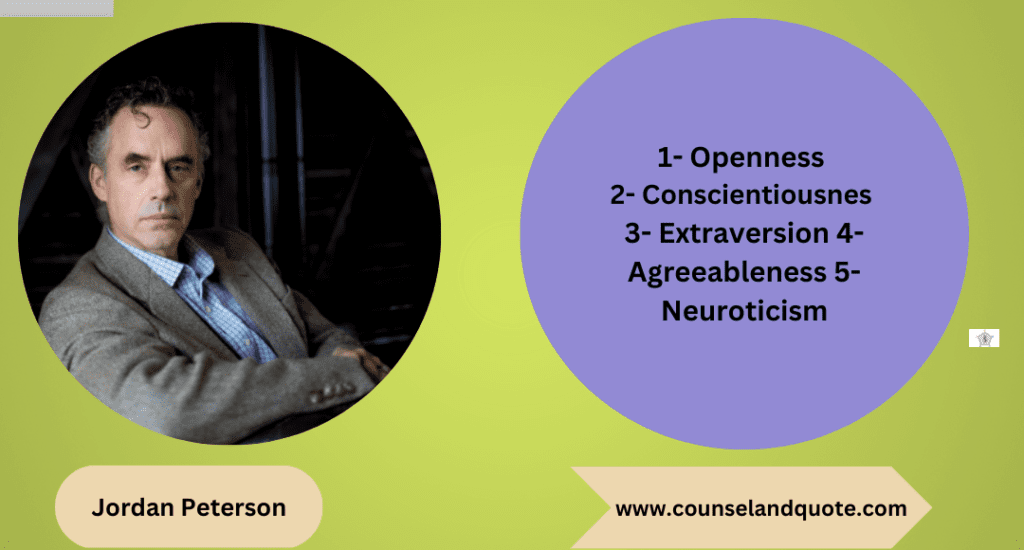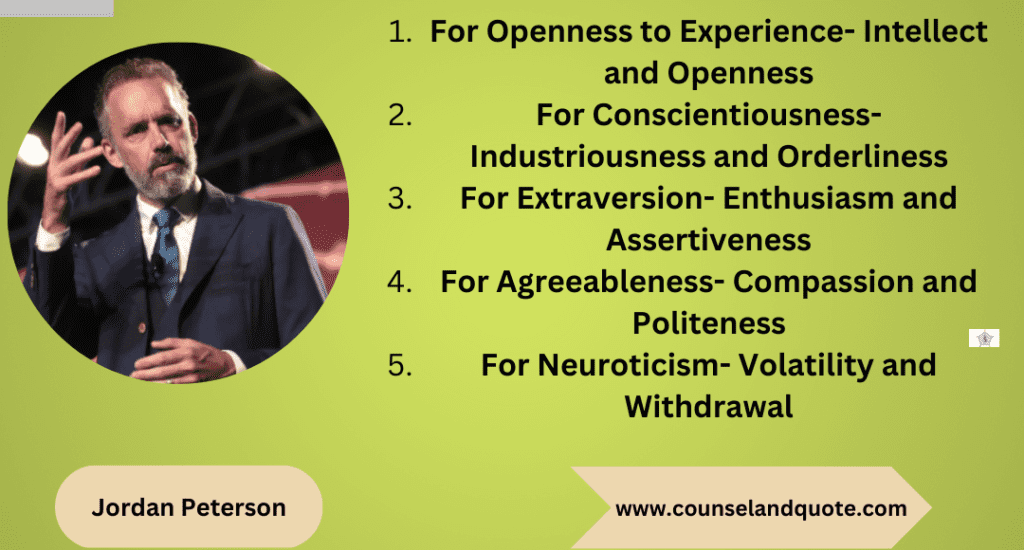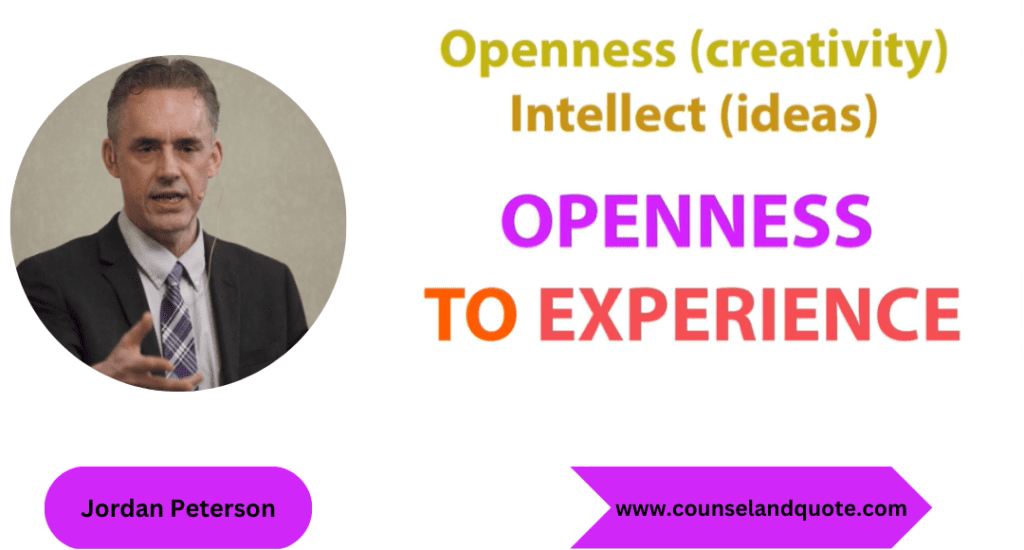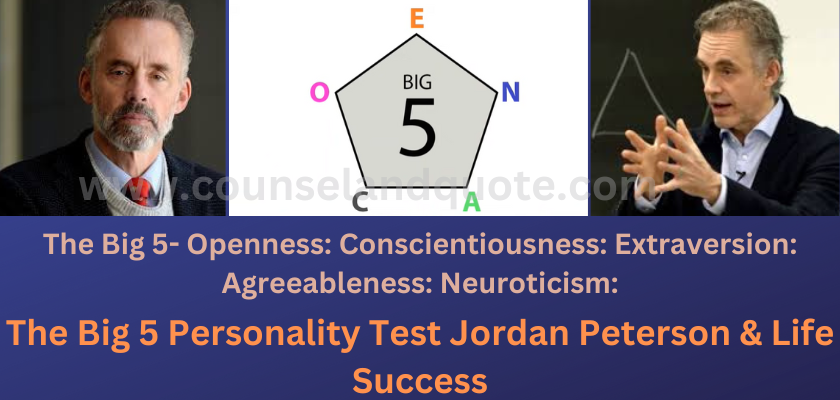‘Big 5 Personality Test Jordan Peterson’ defines personality dimensions.
The ‘Big 5 Personality Test Jordan Peterson’ helps you know about your personality type. It is also known as ‘Jordan Peterson Big 5’ Personality Traits.
Table of Contents
What Is The Big 5 Personality Test Jordan Peterson?
What Is The Big 5 Personality Test Jordan Peterson?
It is a personality analysis of an individual based on the Big 5 personality dimensions.
This test is based on psychometric analysis. Psychometry is a branch of psychology.
The full form of psychometry is psychological measurement.
This branch is specialized in developing, administering, assessing, interpreting and explaining psychological variables such as personality traits, cognitive skills, and intelligence.

It tells you about the 5 different dimensions under which human behaviour exists.
These 5 dimensions are 1- Openness 2- Conscientiousness 3- Extraversion 4- Agreeableness 5- Neuroticism
These dimensions tell us about our personalities. These dimensions tell us about others’ personalities.
Jordan Peterson Personality Test- ‘Understand Myself’ Or Big Five Aspect Scale
‘Understand Myself‘ or Big Five Aspect Scale is a psychometric methodology to judge a person’s personality.
This test is designed and developed with the joint efforts of three masterminds. They are Jordan Peterson, Professor Colin DeYoung, and Lena Quilty. Other noticeable contributors to this cause are Jeremy Gray, Dr Daniel M. Higgins and Dr Robert O. Phil.
The test has 5 human aspects or dimensions. They are openness, conscientiousness, extraversion, agreeableness, & neuroticism.
Each dimension has a lower and a higher range.
In this test, you have to answer a hundred questions. There are different options given to you, like, “carry out my plans,” “respect authority,” and “like to solve complex problems,”.
The results of this personality test define your personality type. Personalities are basically deep. It guides you and directs you to your desired goal.
When you know yourself better, you adjust your goals and strategies. It helps you improve your career and relationships.
What Are Jordan Peterson’s Big 5 Aspects?

Jordan Peterson’s Big 5 aspects are categorized in his own words below.
- For Openness to Experience- Intellect and Openness
- For Conscientiousness- Industriousness and Orderliness
- For Extraversion- Enthusiasm and Assertiveness
- For Agreeableness- Compassion and Politeness
- For Neuroticism- Volatility and Withdrawal
What Is Personality?
Personality is derived from the Latin word persona. In Latin, it means a mask worn by a performer to play different roles.
In modern parlance, personality is the unique combination of feeling, thought and behaviour. It is a product of your biology and surroundings.
How Is Personality Responsible For Success?
There is a very famous Circassian proverb.
“When a clown moves into a palace, he doesn’t become a king the palace becomes a circus.”
You have to be extremely careful who you are giving easy access to in your life. No matter how much you are in control of your life, only one person is enough to destroy it completely.
The proverb is a testimony that your personality gives you success or suffering.
It all depends on the kind of personality you have. It constructs you and breaks you.
Your personality is the editor of your life. It writes your story. The best news is that you can improve your personality. It means there is always room available for becoming better and more successful in life.
The direct relationship between your personality and success makes you incumbent upon looking at yourself, your feelings, actions, behaviours and results.
Jordan Peterson Big 5 Personality Test
Jordan Peterson has done mammoth work on human psychology.
Let’s know about the 5 personality traits and their roles in making or breaking you.
1- Openness

- One of the key topics he has discussed is the “Openness” personality trait.
- Openness is one of the five major personality traits, known as the Big Five.
- It refers to an individual’s tendency to be imaginative, curious, and open to new experiences.
- It is often measured in psychological assessments using the Openness to Experience scale, which assesses an individual’s receptivity to new ideas, feelings, values, and experiences.
- According to Peterson, individuals who score high in Openness tend to be more creative, imaginative, and adventurous.
- They are more likely to embrace new ideas and experiences, and they are often interested in exploring diverse perspectives and worldviews.
- They tend to be intellectually curious and enjoy learning about a wide range of subjects.
- However, Peterson has also noted that high Openness can come with its own set of challenges. Individuals who score high in this trait may struggle with the practicalities of everyday life and may find it difficult to maintain stable relationships or consistent employment. They may also be more prone to anxiety and depression.
- In Peterson’s view, Openness is an important trait because it allows individuals to adapt to changing circumstances and thrive in new and uncertain environments.
- He believes that individuals who are high in Openness are more likely to be successful in creative or entrepreneurial fields, as well as in academic pursuits.
- Peterson has also argued that Openness can be cultivated through intentional effort.
- He suggests that individuals who want to increase their Openness should seek out new experiences, challenge their assumptions and beliefs, and actively seek out diverse perspectives. By doing so, they can expand their horizons and become more open to the world around them.
2- Conscientiousness

- Conscientiousness refers to the degree to which individuals are reliable, responsible, organized, and self-disciplined.
- It is a personality trait that is strongly associated with success in both personal and professional domains.
- Individuals who score high in conscientiousness tend to be diligent, dependable, and committed to achieving their goals. Those who score low in this trait are often disorganized, careless, and prone to procrastination.
- According to Peterson, conscientiousness is an essential trait that can help individuals achieve their goals and fulfil their potential.
- He believes that conscientiousness is a fundamental aspect of human nature and it plays a critical role in shaping our behaviour and attitudes towards life.
Peterson has identified several sub-traits that are associated with conscientiousness. These characteristics are
- 1. Industriousness– This refers to the degree to which individuals are hard-working and persistent in their efforts to achieve their goals.
- Individuals who score high in this trait tend to be diligent, focused, and driven, while those who score low may struggle with procrastination and lack of motivation.
- 2. Orderliness– This refers to the degree to which individuals are organized, tidy, and detail-oriented.
- Those who score high in this trait tend to be efficient and methodical, while those who score low may struggle with disorganization and lack of structure.
- 3. Responsibility– This refers to the degree to which individuals are reliable, accountable, and trustworthy.
- Those who score high in this trait tend to take ownership of their actions and are committed to fulfilling their obligations, while those who score low may struggle with follow-through and reliability.
- 4. Self-Discipline– This refers to the degree to which individuals can control their impulses and delay gratification.
- Those who score high in this trait tend to have greater self-control and can resist temptation, while those who score low may struggle with impulsivity and lack of self-control.
- Peterson argues that conscientiousness is a trait that can be developed and improved over time through deliberate practice and effort.
- He believes that cultivating conscientiousness is essential for personal growth and success and that individuals who strive to improve this trait are more likely to achieve their goals and live a fulfilling life
3- Extraversion

- Extraversion is a personality trait in the Big Five model that refers to the degree to which a person is outgoing, assertive, and social.
- Extraverted individuals tend to be talkative, and energetic, and seek out social interaction, while introverted individuals tend to be more reserved, and thoughtful, and prefer solitary activities.
- In terms of the Big Five trait of extraversion, Peterson has described himself as being somewhat introverted, but also possessing elements of extraversion.
- Peterson has mentioned in interviews that he enjoys public speaking and engaging with large groups of people.
- He has built a career on his ability to communicate effectively to audiences, which suggests that he may have a degree of comfort and confidence in social situations that is consistent with extraversion.
- Peterson has also acknowledged that he needs time alone to recharge his batteries and has described himself as somewhat of a solitary person.
- He has mentioned that he enjoys reading and thinking, which suggests a preference for introverted activities.
- Peterson may fall somewhere in the middle of the extraversion spectrum. While he has elements of extraversion, he also has a preference for introverted activities and a need for solitude.
- It is important to note that personality traits exist on a continuum, meaning that individuals can exhibit different levels of extraversion depending on the situation or context.
- For example, a person may be highly extroverted in social situations but more introverted in work or academic settings.
- Therefore, while Peterson has described himself as having elements of both extraversion and introversion, his specific level of extraversion may vary depending on the situation or context.
4- Agreeableness

- In terms of Agreeableness, Peterson believes that individuals who score high in this trait tend to be empathetic, compassionate, and cooperative.
- They are generally more concerned with the needs of others than their own needs.
- They tend to be good listeners. They are often described as warm and friendly.
- They are adept at smoothing over social tensions and conflicts.
- Peterson also acknowledges that individuals who score very high in Agreeableness may struggle with asserting themselves, setting boundaries, and standing up for their own needs and beliefs.
- They may also be overly trusting and vulnerable to manipulation or exploitation by others.
- On the other hand, individuals who score low in Agreeableness tend to be more competitive, sceptical, and critical of others.
- They may be less concerned with social harmony and may prioritize their own needs and goals over those of others.
- While these individuals may be more assertive and effective at advocating for their interests, they may also struggle with maintaining close relationships and may come across as cold or insensitive.
- Peterson emphasizes that while personality traits such as Agreeableness can have both positive and negative aspects, they are not fixed or immutable.
- Through intentional effort and self-reflection, individuals can learn to develop and balance their traits to become more well-rounded and effective in their personal and professional lives.
5- Neuroticism

- Neuroticism is one of the Big Five personality traits that describe the degree to which an individual experiences negative emotions, such as anxiety, sadness, anger, and self-doubt.
- People who score high in neuroticism tend to be more sensitive, anxious, and prone to mood swings.
- They may be more easily overwhelmed by stress and may struggle with self-esteem and self-confidence.
- On the other hand, people who score low in neuroticism tend to be more emotionally stable, resilient, and confident in their ability to handle stress.
- Jordan Peterson has discussed the importance of understanding and managing one’s neuroticism levels in his lectures and writings.
- He argues that neuroticism can be both a strength and a weakness and that people who are high in neuroticism can benefit from developing coping strategies to manage their emotions and improve their mental health.
- Peterson also emphasizes the importance of taking responsibility for one’s emotions and actions, rather than blaming external factors for one’s problems.
- He suggests that developing self-awareness and self-discipline can help individuals with high levels of neuroticism to achieve greater personal and professional success.
- Neuroticism is one of the Big Five personality traits that describe an individual’s tendency to experience negative emotions.
- Jordan Peterson has emphasized the importance of understanding and managing one’s neuroticism levels to achieve personal and professional success.
Conclusion
Jordan Peterson is a well-known Canadian psychologist and public intellectual who has discussed the Big Five personality traits in his lectures and interviews umpteen times.
Jordan Peterson Big 5 personality aspects are expounded here. They are detailed to understand the personality type.
By judging your personality, you can analyze your various life decisions and outcomes more closely.
You can also focus on your professional life and relationships. You can counsel others and improve them.
Collectively all these aspects convert you into a more successful individual. You become smart and efficient.
Your success lies in how well you understand the situation and perform them efficiently.
Please share it with your friends and relatives. They can judge themselves better and change the results of their lives.
May God bless you. Amen.
Thank You.
